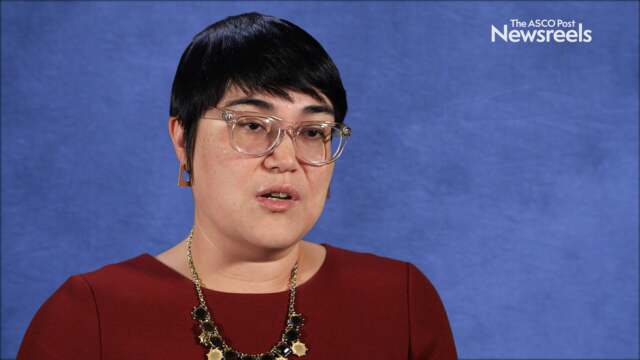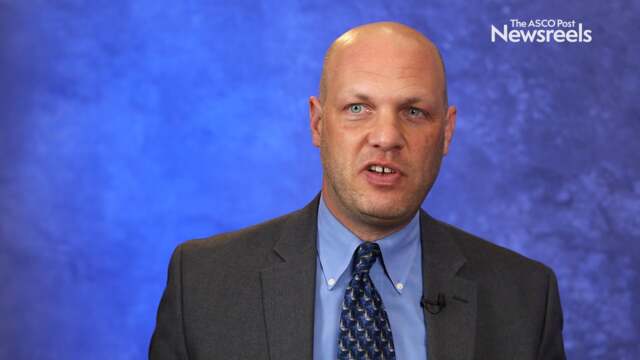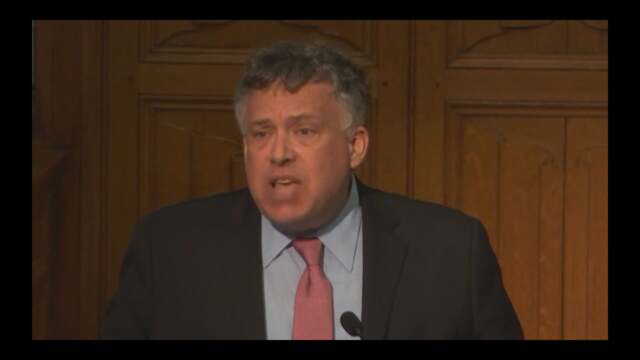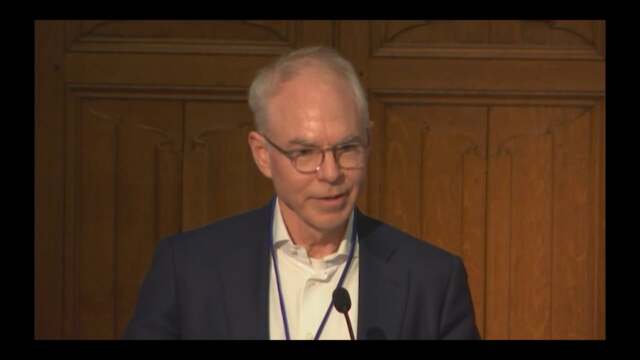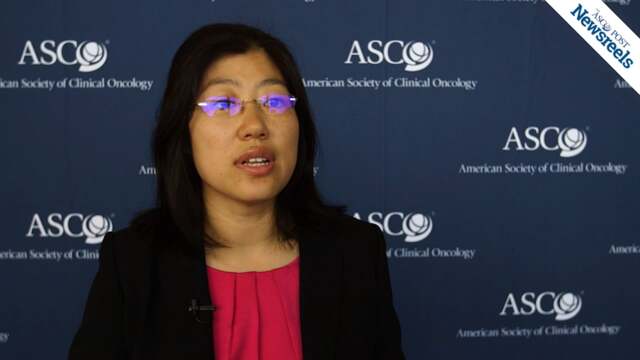Curbside Consults: New Liability Risks to Avoid When You Are Not a Patient’s Physician
Like most clinicians, oncologists often informally consult their colleagues, both asking questions and seeking suggestions on how best to care for their patients.1,2 These informal or “curbside” consults (sometimes called “sidewalk,” “elevator,” or “hallway” consults) are valuable, because the...
Members of Congress Express Support for Cancer Policy Priorities During Capitol Hill Event
ASCO and the American Cancer Society Cancer Action Network (ACS CAN) hosted a reception on Capitol Hill for Members of Congress and their staff to underscore the two organizations’ shared policy priorities to improve research and cancer care delivery for patients and survivors. During the...
Statement on White House’s FY2020 Budget Proposal by ASCO President Monica M. Bertagnolli, MD, FACS, FASCO
ASCO President Monica M. Bertagnolli, MD, FACS, FASCO, issued the following statement earlier this week: We strongly oppose the White House budget proposal for fiscal year (FY) 2020, which would stall our nation's progress against cancer and impede access to needed care for the millions of...
ASCO Clinical Cancer Advances 2019 Names Advance of the Year: Progress in Treating Rare Cancers
Over the past year, major research advances provided new treatment options for patients with rare, difficult-to-treat cancers. In recognition of these achievements, ASCO named “Progress in Treating Rare Cancers” as the Advance of the Year. To continue the forward momentum, ASCO also...
New Regulations Require Better Communication With Patients Who Have Disabilities and Limited English Proficiency
Ever since President Barack Obama signed the Patient Protection and Affordable Care Act (ACA) into law on March 23, 2010, the nondiscrimination provision of the law, Section 1557, which prohibits discrimination on the basis of race, color, national origin, sex, age, or disability in certain health ...
Will the Trump Administration’s Plan to Reduce Cancer Drug Prices Work?
High drug prices are the number one health-care concern of many Americans. The average price of a cancer drug rose from less than $10,000/yr before 2000 to more than $170,000/yr in 2017.1-3 Between 1995 and 2013, the launch price of cancer drugs increased by 10% to 12% every year, and the average...
Pharmacy ‘Gag Clause’ Bills Signed Into Law
This past month, President Trump signed a pair of bills into law aimed at increasing transparency with regard to drug prices in the United States. The Patient Right to Know Drug Prices Act (S.2554) and the Know the Lowest Price Act (S.2553) prohibit so-called “gag clauses,” which prevent...
Labeling Act to Keep Drug Label Information Up-to-Date Introduced to Senate
Friends of Cancer Research (Friends) recognized Senators Orrin Hatch (R–UT) and Michael Bennet (D–CO) for responding to a recently identified public health issue and proposing a solution to an issue impacting patients and their physicians. Senators Hatch and Bennet jointly introduced the Making...
AACR Releases Annual Cancer Progress Report
The American Association for Cancer Research (AACR) has released its annual Cancer Progress Report,1 highlighting how federally funded research discoveries are fueling the development of new and even more effective ways to prevent, detect, diagnose, and treat cancer. Key advances outlined in the...
Fumiko Ladd Chino, MD, on Opioid-Associated Deaths in Patients With Cancer
Fumiko Ladd Chino, MD, of Duke University, discusses results from a population study she conducted of the opioid epidemic over the past 10 years and why these medications for cancer pain should continue to be excluded from restrictive-prescribing laws (Abstract 230).
New Laws Limiting Opioid Prescriptions Create Undue Barriers for Patients With Cancer and Cancer Survivors
Among other policy responses to the growing opioid epidemic, many states have enacted legislation that limits the duration or amount of opioid prescriptions issued by physicians. Although, it is clear we need strong measures to mitigate widespread overuse and misuse of opioids. These...
Why Oncologists Should Decline to Participate in the Right to Try Act
ON MAY 30, 2018, President Donald J. Trump signed into law the Trickett Wendler, Frank Mongiello, Jordan McLinn, and Matthew Bellina Right to Try Act of 2017.1 This law creates an additional and alternative pathway for patients with a “life-threatening disease or condition” to access...
Thaddeus Mason Pope, JD, PhD, on Right to Try: Expert Perspective
Thaddeus Mason Pope, JD, PhD, of the Mitchell Hamline School of Law, discusses implications of the federal “Right to Try” law, recently enacted.
FDA Statement on the Signing of the Right to Try Act
U.S. Food and Drug Administration (FDA) Commissioner Scott Gottlieb, MD, released the following statement today: For patients with serious or immediately life-threatening diseases, the FDA remains committed to enhancing access to promising investigational medicines for those unable to access...
Childhood Cancer STAR Act Approved by Senate and House
On May 22, the Childhood Cancer Survivorship Treatment Access and Research (STAR) Act was passed by the Senate and House and is now being sent to President Donald Trump to be signed into law. As the most comprehensive childhood cancer bill ever introduced to Congress, the Childhood Cancer STAR Act...
New Laws Reduce Costs of Oral Cancer Drugs, but Not for All
The rising cost of anticancer drugs not only adds fiscal pressure to our overburdened health-care system, but also increases the stress on patients with cancer and their families. High out-of-pocket spending may cause significant financial toxicity, even for patients with good health insurance...
Decision Aids Reflect Patients’ Values and Preferences for Care: So Why Aren’t More Oncologists Using Them?
Overwhelming evidence shows that patient decision aids, such as educational booklets, videos, or Web-based tools that take into account patients’ values and personal preferences, hold enormous promise for improving the informed consent process. Patient decision aids both reduce unwanted medical...
Roy Herbst, MD, PhD, on Legal and Policy Issues Associated With Cutting-Edge Cancer Treatments
Roy Herbst, MD, PhD, Chief of Medical Oncology, Yale Cancer Center and Smilow Cancer Hospital, speaks during Panel 5: Legal and Policy Issues Associated With Cutting-Edge Cancer Treatments at The Policy, Politics and Law of Cancer, presented by The Solomon Center for Health Law and Policy at Yale Law School, in collaboration with Smilow Cancer Hospital and Yale Cancer Center.
Charles Sawyers, MD, on Legal and Policy Issues Associated With Cutting-Edge Cancer Treatments
Charles Sawyers, MD, Chair, Human Oncology and Pathogenesis Program, Memorial Sloan Kettering Cancer Center, speaks during Panel 5: Legal and Policy Issues Associated With Cutting-Edge Cancer Treatments at The Policy, Politics and Law of Cancer, presented by The Solomon Center for Health Law and Policy at Yale Law School, in collaboration with Smilow Cancer Hospital and Yale Cancer Center.
ASCO Commends Congress for NIH Funding
On March 23, 2018, ASCO President Bruce E. Johnson, MD, FASCO, issued the following statement: The American Society of Clinical Oncology (ASCO) applauds Congress for its bipartisan support of the omnibus spending bill that significantly boosts our nation’s investment in biomedical research. By...
Why Right-to-Try Laws Are Dangerous
Why wouldn’t you support a patient with a terminal illness the “right to try” any therapy that may save his or her life? The answer to this question—one engulfed in a political debate in Congress—seems simple. It is not. [Editor’s Note: [Editor’s Note: On May 30, 2018, the President signed into...
Why Right-to-Try Laws Are Dangerous
Why wouldn’t you support a patient with a terminal illness the “right to try” any therapy that may save his or her life? The answer to this question—one engulfed in a political debate in Congress—seems simple. It is not. [Editor’s Note: On May 30, 2018, the President signed into law the Trickett...
Medical Aid in Dying: When Legal Safeguards Become Burdensome Obstacles
In 2017, the District of Columbia (DC) became the seventh jurisdiction in the United States to legalize medical aid in dying,1 which gives terminally ill patients the option of how and when they die. The new DC statute is nearly identical to earlier enacted medical aid in dying statutes in...
Nearly 100 Leading Cancer Researchers and Physician-Scientists Urge Congress to Reach a Bipartisan Budget Agreement and Invest in Medical Research
On December 6, the American Association for Cancer Research (AACR) delivered a letter from the current AACR President and Past Presidents—as well as Fellows of the AACR Academy that include 18 Nobel Laureates—to urge leaders in the House and Senate to “move quickly to finalize a...
Hospital Groups File Lawsuit to Stop Significant Payment Cuts for 340B Hospitals
The American Hospital Association (AHA), the Association of American Medical Colleges (AAMC), and America’s Essential Hospitals have filed a lawsuit against the U.S. Department of Health and Human Services (HHS) in the U.S. District Court for the District of Columbia to prevent significant...
Cancer Policy Priorities Front and Center on Capitol Hill
On September 27 and 28, more than 100 ASCO volunteers headed to Capitol Hill to participate in the 2nd Annual ASCO Advocacy Summit. During the Summit, advocates met with members of Congress and staff to educate them on critical issues affecting patients and providers and to encourage policymakers...
FDA Announces New Comprehensive Plan for Tobacco and Nicotine Regulation
Recently, the U.S. Food and Drug Administration (FDA) announced a new strategy to address tobacco-related disease and death. The agency seeks to develop a plan to reduce the nicotine levels in combustible cigarettes to nonaddictive levels. However, as part of the strategy, the FDA also announced it ...
Senate Passes the RACE for Children Act
On August 3, the leadership of Kids v Cancer, an advocacy group promoting pediatric cancer research, issued the following statement: Today, the U.S. Senate passed the FDA Reauthorization Act and with it, the RACE for Children Act. Now, new cancer drugs will be developed not only for...
Making American Research Great Again
In the past 10 years, we have made remarkable advances in how we fight cancer. One of the most powerful new tools in our arsenal is cancer immunotherapy, which reawakens our own immune system to produce stunning results for many suffering from advanced cancer. Immunotherapy saved President Jimmy...
Xuesong Han, PhD, on Early-Stage Diagnosis and the Affordable Care Act: An Epidemiologic Study
Xuesong Han, PhD, of the American Cancer Society, discusses the Affordable Care Act and her study findings showing how implementation of the law is associated with a shift to early-stage diagnosis for all screenable cancers except prostate cancer (likely due to Task Force recommendations against routine screening). (Abstract 6521)
Impact of Proposed Cuts to NIH Budget: More Than Just About Cancer
If enacted, the proposed budget reduction of $5.8 billion to the National Institutes of Health (NIH) will slow research, deprive patients afflicted with cancer of hope, and deliver a devastating blow to our science workforce and the Commonwealth of Pennsylvania. This proposed reduction directly...
Apply for ASCO Health Policy Fellowship to Improve Skills Needed to Shape Cancer Policy
ASCO is now accepting applications for its prestigious Health Policy Fellowship, a 1-year fellowship opportunity designed to give early-career oncologists the unique skills necessary to monitor and shape the regulatory and legislative policies that directly affect the practice environment and...
FDA Takes Action Against 55 Tobacco Retailers for Selling Newly Regulated Products to Minors
The U.S. Food and Drug Administration (FDA) announced on September 15 that it has taken action against 55 tobacco retailers by issuing the first warning letters for selling newly regulated tobacco products—such as e-cigarettes, e-liquids, and cigars—to minors. These actions come about a month after ...
American Cancer Society Cancer Action Network Report Shows States Are Making Progress Implementing Policies to Reduce Toll of Cancer
While a majority of states are still missing important opportunities to pass and implement legislative solutions proven to prevent and fight cancer, progress is being made to move the nation closer to ending cancer as we know it, according to a report recently released by the American Cancer...
AACR Holds Congressional Briefing to Reiterate Moonshot Goals and Plans
“We are in an era of unprecedented scientific opportunities in cancer research,” said Margaret Foti, PhD, MD (hc), Executive Officer, American Association for Cancer Research (AACR), as she introduced the Congressional briefing, “Seizing Today’s Opportunities to Accelerate Cancer Research.” “Thanks ...
CMS Proposal for Part B Drug Payment: A Poorly Conceived Experiment
On March 11, 2016, the Centers for Medicare & Medicaid Services (CMS) issued a proposed rule in the Federal Register to test a change in reimbursement for Part B drugs.1 The first phase involves changing the 6% add-on to the average sales price (ASP) used to make drug payments under Part B to...
Vulnerable Hospitals, Cancer Surgery Readmissions, and Penalizing Payment Programs
Readmission rates after complex cancer operations tend to be higher in hospitals that are considered to be vulnerable because they serve as safety nets in their communities or have a high number of Medicaid patients. Reasons for higher readmission rates are highly complex and involve socioeconomic...
ASH Meets With Officials, Provides Recommendations for the National Cancer Moonshot Initiative
On April 26, 2016, American Society of Hematology (ASH) President Charles S. Abrams, MD, shared the following statement: “Today ASH met with the White House to share scientific recommendations for the National Cancer Moonshot, an initiative spearheaded by Vice President Joe Biden that aims to make...
An Increase for the National Institutes of Health Budget
The National Institutes of Health (NIH) received a nearly $2 billion funding increase—the first large increase for the agency in more than 12 years—in the federal omnibus spending bill Congress passed on December 18, 2015. And President Barack Obama signed the bill into law a day later. The 6.6%...
Giving Women a Fighting Chance When They Have Breast Cancer
I knew there was a chance I could get breast cancer, I just never thought it would really happen to me. I am one of 2.5 million breast cancer survivors living in our country today. Just weeks after getting a clean mammogram and my 41st birthday, I felt a lump in my breast. As a young and otherwise...
President Obama Signs High-mortality Cancer Bill into Law
Just hours before the end of the 112th Congress, constitutional deadline for approval of a bill passed by that Congress, President Barack Obama signed into law the first legislation requiring comprehensive plans of research action for high-mortality cancers, with lung and pancreatic cancers given...
Last-minute ‘Fiscal Cliff’ Deal by Congress Again Averts Medicare Cuts to Physicians
A last-minute patch to the sustainable growth rate formula included in the “fiscal cliff” deal averted massive cuts to oncologists who care for and treat Medicare patients. “This end-of-year crisis management once again demonstrates the critical need for fundamental reform of the Medicare...
Sequestration Will Have Shattering Impact on Entire U.S. Cancer Enterprise
March 1 marked the beginning of sequestration, the unprecedented automatic budget cuts that immediately take effect across the federal government—after months of futile negotiations by the President and Congress. Sequestration will have a shattering impact on the entire cancer enterprise in the...
Focus on the Louisiana Oncology Society
Founded on September 1, 1992, by John M. Rainey, MD, the Louisiana Oncology Society has had numerous legislative successes (see sidebar) since that time, including leading the effort to support Louisiana’s Oral Chemotherapy Parity Law, which was passed in 2012 and is now in effect throughout the...
AACR Briefs Congressional Staffers on Importance of Continued Funding for Research
As we all now know, the start of the sequestration prescribed by the Budget Control Act of 2011 was delayed until March 1, 2013, by the American Taxpayer Relief Act of 2012. With Congress unable to strike a deal, the mandatory reductions in Federal spending were triggered on March 1. Those...
Congress Must Reverse Devastating Budget Cuts to Cancer Care
Sandra M. Swain, MD, FACP, ASCO President, issued the following statement on April 27, 2013: “Today, out of concern for public safety, Congress provided the Federal Aviation Administration enhanced flexibility in application of sequestration related cuts, including reversal of furlough requirements ...
Sequestration's Impact on Cancer Care
On March 1, the deficit-budget mechanism known as sequestration took effect, triggering $85 billion in across-the-board cuts to most federal agencies over the remaining 7 months in fiscal year 2013. The total federal deficit reduction budget under the Budget Control Act of 2011 calls for $1.2...
Innovative State Program Reduces Colorectal Cancer Disparities, Mortality Rates Among African American Patients
A study analyzing the impact of the Delaware Cancer Consortium, the state’s cancer control program, reports a 41% reduction in colorectal mortality rates for African Americans.1 The recently published study provided analysis on a novel design and approach used to eliminate colorectal cancer...
Cancer Organizations Recognize Sen. Shelby and Rep. DeLauro for Their Commitment to the Fight against Cancer
Sen. Richard Shelby (R-AL) and Rep. Rosa DeLauro (D-CT) were recognized recently by the American Society of Clinical Oncology, the American Association for Cancer Research, the Association of American Cancer Institutes, and Friends of Cancer Research for their outstanding commitment to cancer...
